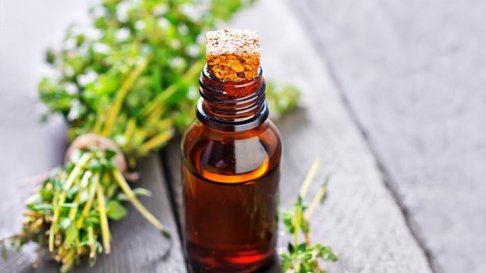
Thyme infused olive oil has many uses from an antibiotic for cuts to an anti-inflammatory. It can reduce anxiety when taken by mouth or used for cooking. It's delicious in Italian food. It's simple to make and it looks nice in some pretty bottles. These make nice gifts too.
***
November 29th, 2016
By Dr. Joseph Mercola
Guest writer for Wake Up World
Superbugs like methicillin-resistant Staphylococcus aureus (MRSA) are on the rise and, unfortunately, are becoming resistant to the drugs used to treat them. When faced with a microbial infection, using natural antibacterial agents may not only be more effective but also safe and risk-free.
In addition to using spices like garlic, essential oils derived from herbs – like thyme oil – not only have antibacterial properties, they also provide a number of other health benefits. Before I go into thyme oil’s antimicrobial functions, let me share some information on the essential oil.

Benefits of Thyme Oil
As I previously mentioned, thyme oil is an effective natural agent against nasty bacterial strains. A study 9presented at the Society for General Microbiology’s spring conference in Edinburgh pointed out that essential oils may be efficient and affordable alternatives to antibiotics in the battle against resistant bacteria.
Among the essential oils tested, cinnamon oil and thyme oil were found to be the most successful against various Staphylococcus species, including the dreaded MRSA. Researchers said that this can help lower antibiotic use and minimize the formation of new resistant strains of microorganisms.
Oil of thyme can also function as a decontaminant for food products. As shown in Food Microbiology, both basil and thyme essential oils exhibited antimicrobial properties against Shigella sonnei and Shigella flexneri that may contaminate food. The compounds thymol and carvacrol in thyme oil demonstrated this benefit.10
Furthermore, thyme oil can be used as a preservative against spoilage and several foodborne germs that can contribute to health problems. It is effective against other forms of bacteria such as Salmonella, Enterococcus, Escherichia and Pseudomonas species.11
Other reports also show that oil of thyme has anti-inflammatory properties. In a research article published in the Journal of Lipid Research,12 six essential oils including thyme oil showed the ability to suppress the inflammatory cyclooxygenase-2 (COX-2) enzyme in the same manner as the antioxidant resveratrol does.
It was noted that the chemical constituent carvacrolwas responsible for this effect. The same study also noted that thyme and the other essential oils activated peroxisome proliferator-activated receptors (PPARs), which help suppress COX-2 expression.13 In addition to these, significant health benefits of thyme oil include:14
Helps reduce symptoms of chronic fatigue syndrome, Stimulates menstrual flow,
Increases circulation and elevates low blood pressure, Eases nervousness and anxiety, Helps fight insomnia, Eliminates bad breath and body odor
Read The Full Article


